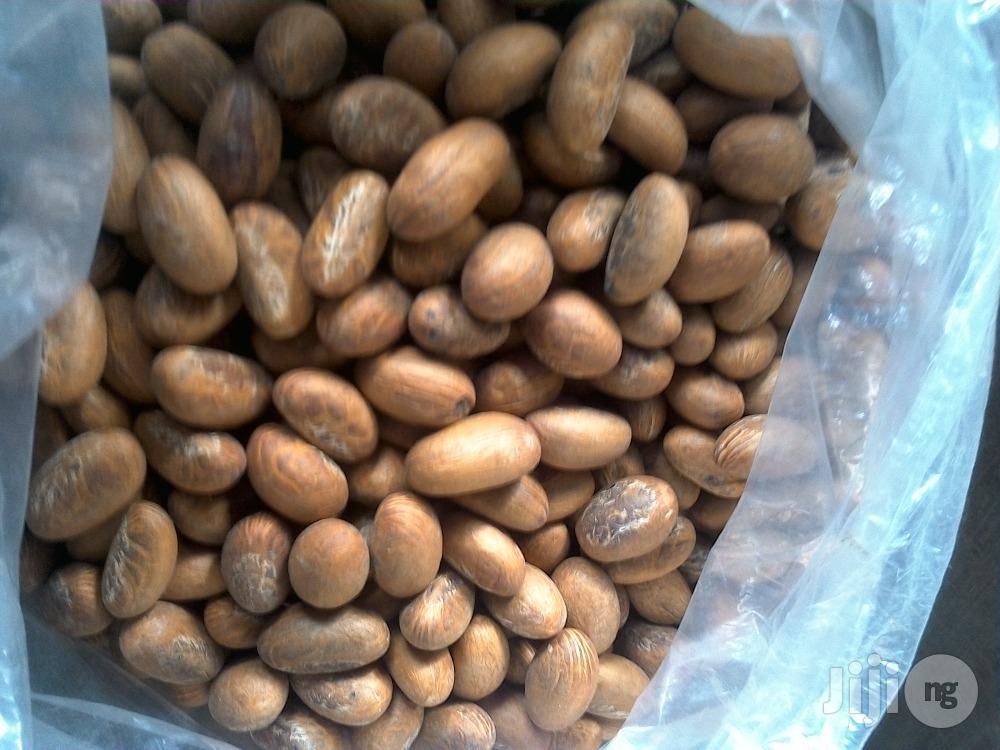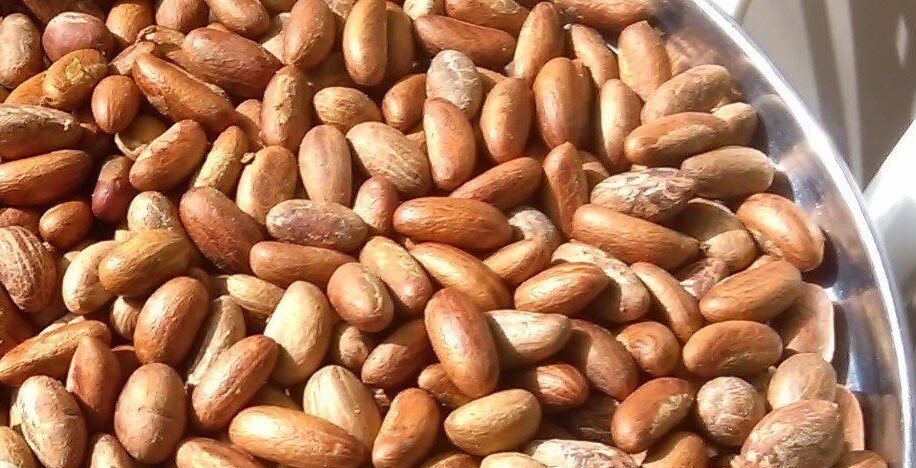What is Bitter (Garcinia) Kola?
Bitter Kola (also called Garcinia kola) is an edible seed, which belongs to a unique group of plants that help organisms to adapt to stress by influencing multiple regulatory systems responsible for stimulus–response coupling such as the immune system and act also as a general anti-infective agent. G. kola, commonly known as bitter kola or male kola, is used in traditional African medicine for the treatment of various infectious diseases, such as hepatitis, infections due to the influenza virus and other viral diseases. The plant elaborates a complex mixture of biflavonoids, prenylated benzophenones, xanthones and calanolide-type coumarines. Recently, Axxon Biopharm Inc. has presented dietary supplements containing G. kola extractives as the main constituent. These products were standardized using the biflavonoids, GB1, GB2 and kolaflavonone as the marker compounds.
Garcinia kola (Bitter kola) fruits are harvested annually between July and October, which makes it a highly seasonal product. Bitter kola fruits are smooth and elliptically shaped, with yellow pulp and brown seed coat. Garcinia kola has economic value across West African countries where the seeds are commonly chewed and used for traditional ceremonies and medicines. It is highly valued for its perceived medicinal attributes, and the fact that consumption of large quantities does not cause indigestion (as cola nuts do) makes it a highly desired product
Health Benefits of Bitter Kola
Bitter Kola is a plant from Africa and it has a lot of health benefits. Almost all the parts on this plant can be used for health purpose. Bitter kola is a highly valued ingredient in African ethno medicine because of its varied and numerous uses which are social and medicinal. Medicinal plants such as G. kola are believed to be an important source of new chemical substances with potential therapeutic benefits.
Below are some of the benefits of bitter kola:
- Cold and fever remedy
- Treating malaria
- Weight Loss
- Prevent diabetes
- Treatment of erectile dysfunction
- Anti-cancerous
- Antimalarial agent
- fight glaucoma
- improve the immune system
- improve the function of the lungs
- remedy for osteoarthritis
- aphrodisiac credentials
- Traditional medicine
- Repellant for snakes
- Life Prolongation
- Anti-Poison
Top Exporting & Importing Countries of Bitter Kola
Bitter kola is a medium sized forest tree found throughout West and Central Africa, also found in large quantities in South, East and Western States of Nigeria. It is a wonderful agricultural product with a wide range of applications in natural and orthodox medicine. Bitter kola is also used for brewery purposes and that has been the reason why bitter kola is demanded in small and in large quantities by the international market.
- Nigeria (principal producer of bitter kola producing about 150, 000 tons of which 90% is consumed locally)
- Benin
- Cameroon
- Democratic Republic of the Congo
- Ivory Coast
- Gabon
- Ghana
- Liberia
- Senegal
- Sierra Leone.
Some of the leading importers of Bitter Kola are:
- USA
- Britain
- Germany
- France
- Italy
- China
- Japan
- India
- Thailand
- Indonesia

How To Safely Source for Your Bitter (Garcinia) Kola Produce
If you find the right export company, buying directly from them can make the purchase process easy and stress-free, when compared with doing the sourcing on your own. That said, there are few things to note when dealing with an export company in Nigeria or Africa. The specific requirements for Nigeria are listed below, but they mostly apply to other African countries:
The exporting company must be registered with the Corporate Affairs Commission (CAC) to make sure the company is registered and permitted to carry out business operations.
The export company must also be registered with the Nigerian Export Promotion Council (NEPC).
The company must possess a domiciliary account to accept international payments.
The company should get all necessary export-related documentation done before the shipment leaves the port of origin. Some of the documents are:
- Certificate of origin
- Bill of lading
- Inspection Certificate (SGS, Cotecna, Bureau Veritas, Intertek, etc)
- Phytosanitary certificate
- Fumigation certificate
Where To Find Reliable Exporters
An important question that still needs to be answered is how to find sesame seed exporters in Nigeria. You can use any of the methods listed below:
- Attend trade fairs
- Use search engines like Google, Yahoo, etc.
- Search for agents on Linkedln
- Sign up on trade platforms (e.g. Alibaba, Tradeford, Go4WorldBusiness)
- Neogric – Neogric is one of the reliable Bitter Kola exporters in Nigeria. Neogric is rated among the best in the exporting business in Nigeria. The company is not limited to the exportation of Bitter Kola alone but can export other agricultural produce ranging from perishables to dry seeds.
International Price of Bitter (Garcinia) Kola Per Metric Ton
The unit price ($ per kg) of Bitter Kola in the international market depends on a host of different factors including:
- The grade of the produce (usually the more the processing, the higher the price)
- The price of the raw material
- Age of the seeds (this can affect the price)
- The quantity ordered (the greater the quantity, the cheaper you can get it per ton)
- Harvest season (it is more costly when it is out of harvest season).
- Freight & haulage cost
- Percentage of markup
- Import duties
- Distance from the country of origin
- Technology/Infrastructure available in country of origin
- Relationship between the buyer and seller
That said, as at July 2022, bitter (garcinia) kola costs between $12,000 and $25,000 per metric ton (1,000 kilograms) in the international market (i.e. $12/kg to $25/kg)
How To Pay For Your Bitter Kola Produce
You can pay for Bitter Kola using different methods, but three of the popular ways of paying for your agric produce are:
- Bank (T/T) Payment
- Advance Payment
- Letter of Credit (LC)
Bank Payment (T/T)
Bank payment is also known as T/T, “Telegraphic Transfer” or “Telex Transfer” In other words, it is an international wire of funds from the buyer’s bank to the seller’s bank.
A T/T is technically not the same as a wire transfer, which is often done through the SWIFT network. However, when a seller or supplier asks for a T/T payment, a wire transfer is what they are really asking for.
The wire transfer based on the SWIFT system is the most common payment method in international trade. Typically, it takes 3-5 working days to clear, and generally costs between 25 and 50 USD, depending on your agreement with the commercial department in your bank.
Advance Payment
There are sellers that will demand anywhere from 30% to 50% advance payment, and for good reason. If both parties have done deals in the past, sellers can ask for a percentage of the sales (about 30%) before they ship the produce and they can request for the remaining amount after a scanned copy of the Bill of Lading has been sent to the buyer.
It is the safest option for exporters and it also guarantees that they will have some funds to help with sourcing. It is popular among manufacturers on B2B marketplaces like Alibaba and also with commodity traders.
However, advance payment carries considerable risk for the importer (buyer) because the exporter (seller) might not be under as much pressure to ensure quality checks compared with a stricter form of payment. Some might even disappear entirely.
Having said that, advance payment is very useful and is widely used. For instance, the seller might need to secure the commodity in the face of increased competition. It can also be used when the exporter needs some money for sourcing the produce or for processing raw materials.
The most important thing is for both importer and exporter to build mutual trust by having a track record of successful deals with each other or other known companies.
Letter of Credit
Letter of Credit is an agreement generated by the bank of the buyer, guaranteeing payment once certain conditions are met. It is one of the safest types of payment available to both buyer and seller.
Some of the types of Letter of credit are:
- Commercial Letter of Credit,
- Sight Letter of Credit
- Transferrable or Non-Transferable Letter of Credit
- Standby Letter of Credit (SBLC)
- Usance or Deferred Payment Letter of Credit
- Revocable or Irrevocable Letter of Credit
- Confirmed or Unconfirmed Letter of Credit
- Revolving Letter of Credit
- Green Clause Letter of Credit
- Red Clause Letter of Credit
L/Cs are not totally safe (for either buyer or seller) too. For instance, sellers can ship substandard products or those that are different from the ones agreed upon. In this case, the seller gets paid and the buyer receives good he cannot use.
And speaking of the dangers of L/Cs for the exporter, the conditions in the Letter of credit might be practically impossible to fulfil; if an exporter agrees to such, he might be unable to receive payment. A report stated that of the letters of credit received in the UK, 50% are unworkable while 70% are rejected by the banks for payment.
Shipping & Delivery Terms
When shipping your products, it is important to take note of a few factors:
Order Quantity
For smaller shipments, airfreight is often the preferred option but as the order volume increases, sea freight could become significantly cheaper. Usually when the order is close to a full container load (20 ft), sea freight is used. Despite all these, the Covid-19 pandemic has caused an increase in cost of delivery of products.
Cost of Delivery
When the order is of a large volume, sea freight often turns out cheaper than air freight. In fact, airfreight could be up to 6 times more costly than sea freight if the volume is large enough.
Time of Delivery
Sometimes, time will be more important to the buyer than the cost of delivering the produce. In this case, air freight will be the logical option (as stated above, the cost will be more). But if you have more time as a buyer, you should strongly consider using sea freight.
Incoterms
Incoterms refer to generally accepted shipping and payments terms. For example, buyers that have representatives in the source country or that can negotiate with the freight company can use the Free of Board (FOB) terms, since it gives them more control and can save them some money.
However, if the shipment is small or the buyer doesn’t have an extensive network to effectively handle payment for freight, insurance and port charges, he will be better off choosing the Cost-Insurance-Freight (CIF) payment option.
Import Bitter (Garcinia) Kola The Right Way with Neogric
Neogric is a trusted global agric order sourcing and fulfilment company with deep expertise in the bitter/garcinia kola industry. Our end-to-end supply chain solution makes the export of quality bitter/garcinia kola nut easy, quick and safe. Whichever region of the world you are, be it Europe, Asia, USA, Canada, Mexico, Africa, South America or Oceania, you can reliably order your agric products and we will ensure it is successfully delivered to you.
Our Bitter Kola Trade Specifications are listed below:
- Origin: Nigeria
- Product Name: Bitter (Garcinia) Kola
- Physical Specification: Based On Buyer’s Specification
- Quantity: Based On Buyer’s Specification
- MOQ: 10 Metric Tonnes
- Trade Process: Ex Works/FOB/CIF
- Admixture/Impurities: 2% Max
- Inspection: SGS/Cotecna/Intertek/Bureau Veritas
- Packaging: Based On Buyer’s Specification
- Payment Method: TT (Bank Transfer) or L/C
- Shipping Time: 15 to 25 Days After Confirmation of TT or L/C
- Loading Port: Lagos, Nigeria or Tema, Ghana
Expected Shipping Documents
- Bill of Lading
- Certificate of Origin
- SGS Inspection Certificate
- Phytosanitary Certificate
- Fumigation Certificate
- Commercial Invoice
- Packing List
Tel: +2348147860157
Email: neo@neogric.com
WhatsApp:
Place Your Bitter (Garcinia) Kola Order
Click the button below and tell us about your Bitter/Garcinia Kola needs. We will be glad to help you export Garcinia Kola based on mutually agreed terms.
Agric Market Articles & Insights
- Raw African Gold: Complete Guide on How To Trade & Buy From Africa
- 10 Amazing Health Benefits of Kola Nut (Cola Nitida & Cola Acuminata) You Probably Didn’t Know
- Top 30 Global Suppliers and Exporters of Kola Nut (Cola Nitida & Cola Acuminata)
- Dried Split Ginger: Complete Guide on Import/Export From Nigeria & Africa
- Kola Nut Powder: Complete Guide on Import/Export From Nigeria & Africa
- Dried Kola Nut: Complete Guide on Import/Export From Nigeria & Africa
- Kolanut: Uses, Health Benefits, Side Effects and Purchase
- Shea Nut: Uses, Health Benefits, Side Effects and Purchase
- 5 Highly Profitable Categories of Agric Produce in Africa
- Moringa: Uses, Health Benefits & All You Need To Know
- Organic Fertilizer: All You Need To Know About The Benefits, Procedures & Best Practices
- Top 7 Traditional Uses Of Kolanut
- Chili Pepper: Complete Guide on Import/Export From Nigeria & Africa
- Chili Pepper Medicinal Application and Health Advantages
- 10 Amazing Uses and Health Benefits of Bitter (Garcinia) Kola You Probably Don’t Know
- The Health Benefits & Uses of Sorghum You Should Know
- Cashew Nut Kernels: Complete Guide on Import/Export From Nigeria & Africa
- Top 10 Most Profitable Agriculture Business Ideas 2024
- Shea Nut: Complete Guide on Import/Export From Nigeria & Africa
- Bitter (Garcinia) Kola: Complete Guide on Import/Export From Nigeria & Africa


